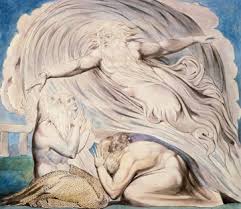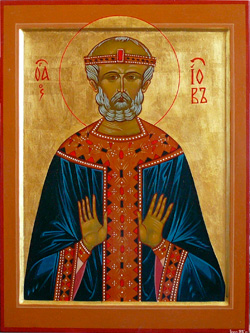A mortal, born of woman, few of days and full of trouble,
comes up like a flower and withers,
flees like a shadow and does not last.
Aint that the truth! Here we are, most of us touched by tragedy, haunted by grief, knowing that our days on earth are limited; and we muddle through.
There’s more to life than this, of course. There’s love, and times of joy, and other good things, but the Old Testament Book of Job, from which these words come, touches a nerve. Biblical scholars tell us that that book, above all other biblical works, explores the issue of theodicy. To put it simply, is God good, or is God a monster or just indifferent to human suffering? Or are we fools to think that there is a God?
In my last two years of high school, I concentrated on three areas of study, as was the way for English schoolchildren. My choice: History, English Literature, and the Bible. In my work on the Bible, I had specifically to study the Book of Job. I was fascinated and repelled, in equal measure. Such wonderful poetry, and such high and serious issues discussed, yet with a breathtaking matter-of-factness and lack of sentiment.
I mean: the whole book issues from a wager that God has with Satan. God praises Job’s faith to Satan the cynic who says: Put him in my power, and that will go away. Stung, God agrees. Everything Job has and all he loves, including his children and his health, is taken from him, violently. Even his wife tells him to curse God and die. What kind of God does that?!
As I’ve got older, I realize that I posed the wrong question. I should instead have asked: what kind of story is this? Once I did, then a whole new world opened to me. The story forces us to accept the serendipity of life, it forbids us being sentimental about God, and enables us to explore really important questions about human suffering.
In the pages of this book, you’ll find discussed, artfully, not just why God allows suffering, but also many of the questions that ordinary people ask about the human condition. For example, is suffering a just punishment for my wrongdoing; is it something I can’t yet understand, but maybe one day will; if I obsess about suffering, am I likely to miss the enduring beauty and love in the world around me, blinded as I am by present pain; is anguish just part of life’s rich pattern? I could go on… And will! Why is life so often, and for so many people, short and brutal? Why is suffering usually an anguish of heart, mind and spirit, as much as a physical pain? These and many such questions are explored in the book of Job.
It offers no clear-cut A+ answer to these questions. It seems occasionally to come close to offering a variety of answers, but then never endorses any of them. And it ends as matter-of-factly, cruelly, and shockingly as it begins. Job, who has clung on to faith, despite everything, is rewarded for this endeavor. We are told that “The Lord blessed the latter days of Job more than his beginning; and he had fourteen thousand sheep, six thousand camels, a thousand yoke of oxen, and a thousand donkeys. He also had seven sons and three daughters.” As if it’s acceptable for God simply to replace the things we love, and that makes everything okay.
And yet… Again, as I’ve got older, my views of the book have changed. I used to see it, as it were, from one remove, as an academic historian of religion, asking whether and how it’s a serious contribution to ideas about God’s involvement in human suffering. Now, I bring to it my life and, reading it, I ask myself whether therein is balm for my wounded soul.
And, recognizing my need of healing, I see things I never saw before. I used to tut-tut at the end of the story. Now, I know that, receiving grace after heartbreak, we don’t get restored to us what we want, but other gifts that might at least offer us a measure of hope and comfort. Some of the answers on offer to the problem of suffering that I used to dismiss, I now find… complicated. For one thing: when Job’s friends tell him he can’t have been the Goody Two-shoes that he seems, because suffering is the consequence of sin, it’s easy to point out what nonsense that often is and how someone can be blamed quite unfairly thereby. Yet, I can’t, hand on heart, tell you that some of the suffering I’ve caused myself and, worse, others, hasn’t been the result of my folly and wickedness.
I used to think that the Book of Job’s failure lay in its unwillingness to answer any or all of the questions it raises about human suffering. I know now that therein lies its brilliance. It offers us: possibilities, not certainties; realism, not sentimentality; wisdom, and not knowledge.
So, is God, indeed, just in all she does? The Book of Job admits that God doesn’t always seem to be just, and that sometimes he isn’t so, but contends that this doesn’t destroy the possibility that he exists and that he cares. At the end of the book, God appears to Job and, in the most wonderful poetry, puts Job firmly in his place.
‘Then the Lord answered Job out of the whirlwind:
“Who is this that darkens counsel by words without knowledge?
Gird up your loins like a man,
I will question you, and you shall declare to me.
“Where were you when I laid the foundation of the earth?
Tell me, if you have understanding.
Who determined its measurements—surely you know!
Or who stretched the line upon it?
On what were its bases sunk,
or who laid its cornerstone
when the morning stars sang together
and all the heavenly beings shouted for joy?”’
A purple passage, indeed. Yet one that makes God into little better than a cosmic bully who tells Job he knows nothing of any importance about how and why the universe is; or so I thought. Now, in the autumn of my life, I realize how little I know of importance about anything, how many mistakes I’ve made. And I see other possibilities in the passage: God’s willingness to engage with bewildered and vulnerable people; her ironic, sardonic humor that forces us to man up as well as tear up in impossible circumstances; her compassion for us, who demand justice when instead we could look beyond present trials to a mysterious kingdom of love, where God will wipe every tear from our eyes.
For Christians, the Book of Job isn’t the last word about human suffering. We believe in the paradox of a crucified God. In Jesus, God enters into human suffering, and makes it redemptive. That’s the subject of another sermon, one for Gary or Joe to explain. My heart can accept it but my mind and tongue cannot quite make sense of it.
For sure, any serious and meaningful attempt to explain God’s involvement in human suffering has to engage with the difficult mystery that sometimes he permits what he doesn’t necessarily want to happen. It’s not just Christians, of course, who read Job in order to protest why bad things happen to good people. After all, the Book of Job was written by Jews. Last century’s Holocaust, in which one out of every three Jews in the world perished, has in the years since, shaped Jewish and Christian thinking about the sheer scale of human suffering, and whether that gives the lie to any credible belief in a God who cares.
When Jesus talked about his own suffering, and that of others who followed him, many enthusiastic supporters fell away. So, Jesus asked his twelve closest disciples, “Do you also wish to go away?” Simon Peter answered him, “Lord, to whom can we go? You have the words of eternal life”. I’ve often thought of that passage, when contemplating or observing great, almost unbearable, suffering. We may be angry with God, but to whom else can we go?
Elie Wiesel, who survived Auschwitz, observed an incident there, which he later turned into a play, set in a village in Ukraine, in the aftermath of a pogrom, a state organized massacre of Jews. In explaining how the play came to be, Wiesel wrote: “Inside [Auschwitz] the kingdom of night, I witnessed a strange trial. Three rabbis—all erudite and pious men—decided one winter evening to indict God for allowing his children to be massacred. I remember: I was there, and I felt like crying. But nobody cried”.
In Wiesel’s play, the trial lasts several nights. Witnesses testify, the evidence is sifted, and finally there’s a unanimous verdict: God Almighty, Creator of Heaven and Earth, is found guilty of crimes against humanity. And then, after what Wiesel calls an “infinity of silence”, one among them, a religious scholar, says, “It’s time for evening prayers”, and the members of the tribunal, who had reached the guilty verdict, bow their heads in reverence and recite the evening service.
What a good job you are still preaching,Martin !
Thank you, David. I thought I was burned out but, sometimes, I can still get fired up!